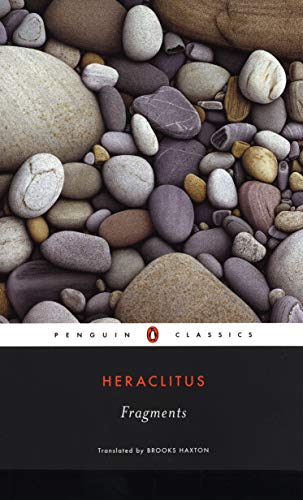Heraclitus of Ephesus
Twenty-five hundred years before Einstein, Heraclitus of Ephesus declared that energy is the essence of matter, that everything becomes energy in flux. Heraclitus is considered be one of the prominent thinkers of Stoic philosophy. (Read more about Stoic Philosophy.)
His fondness for word play, and his belief in unity of opposites have resulted in his thoughts having a simple aphoristic style, but with the significance of an oracle’s prophecy.
Diogenes Laërtius has a quote summing up Heraclitus’s philosophy:
All things come into being by conflict of opposites, and the sum of things (“the whole”) flows like a stream.
His book, On Nature, the world’s first coherent philosophical treatise has long been lost to history. It’s surviving fragments are summarized in this book Fragments.
Fragments Book Summary
Note: This summary is made up of my notes, thoughts and highlights of important passages while reading the book. I keep updating the summary when I revisit it, and occasionally may edit it to reduce summary length. Don’t be surprised if it has changed between visits. The author’s words are in normal font, while my interpretations are in italics.
Many fail to grasp what they have seen, and cannot judge what they have learned, although they tell themselves they know.
Whoever cannot seek the unforeseen sees nothing, for the known way is an impasse.
What eyes witness, ears believe on hearsay.
The river where you set your foot just now is gone— those waters giving way to this, now this.
On Wisdom
Wisdom is the oneness of mind that guides and permeates all things.
Of all the words yet spoken, none comes quite as far as wisdom, which is the action of the mind beyond all things that may be said.
Seekers of wisdom first need sound intelligence.
Applicants for wisdom do what I have done: inquire within.
Opposites
The way up is the way back.
The beginning is the end.
A man in the quiet of the night is kindled like a fire soon quenched.
On Change and Time
Time is a game played beautifully by children.
Just as the river where I step is not the same, and is, so I am as I am not.
The above thought is more popular in the below form:
“No man ever steps in the same river twice, for it’s not the same river and he’s not the same man.”
The habit of knowledge is not human but divine.
The luckiest men die worthwhile deaths.
Always having what we want may not be the best good fortune.
Health seems sweetest after sickness, food in hunger, goodness in the wake of evil, and at the end of daylong labor sleep.
Stupidity is better kept a secret than displayed.
Sound thinking is to listen well and choose one course of action.
Any day stands equal to the rest.
One’s bearing shapes one’s fate.
Brevity of thought!
Silence, healing.
Read More Like This
- Stoicism: A Philosophy for Living
- The Manual for Living by Epictetus
- Freedom from the Known by J Krishnamurti
Recent Articles

